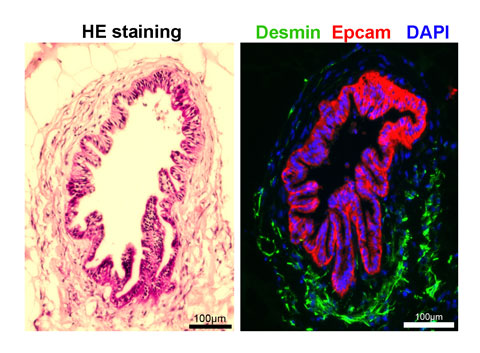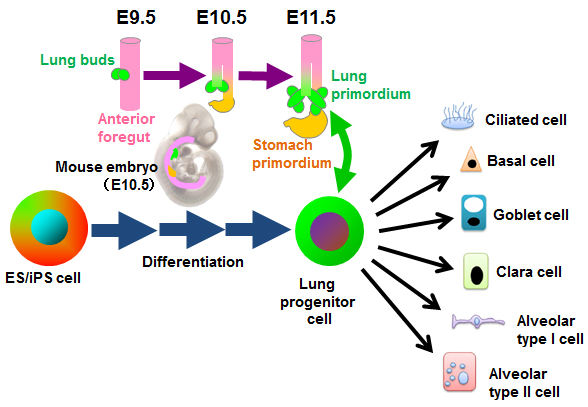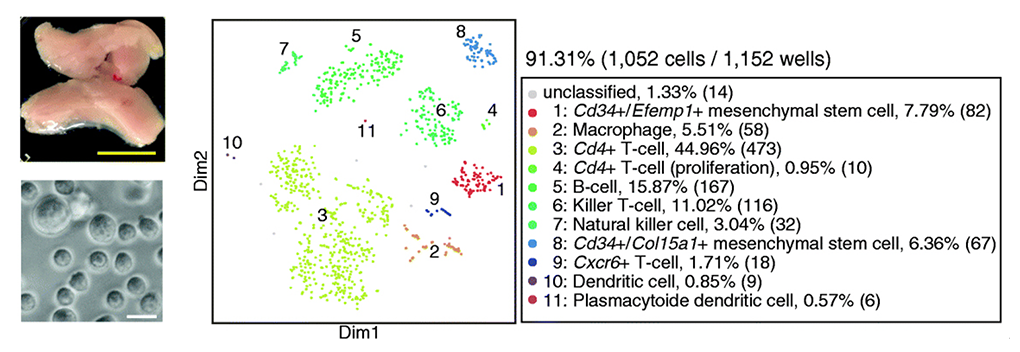Stem Cell Technologies Lab
Outline of Research
Pluripotent stem cells, such as embryonic stem (ES) cells and induced pluripotent stem (iPS) cells, have abilities of unlimited self-renewal and multiple differentiations into all the tissue cells of the body. Therefore, these stem cells find potential application in regenerative medicine and drug discovery, and it is very important to strictly regulate this potent differentiation ability to induce multi-step differentiation of these stem cells toward functional tissue cells. During mammalian development, cells differentiate to form precise 3D structures of organs. Understanding of this process could contribute to the development of in vitro differentiation methods. Our goal is to understand the mechanisms of stomach and lung development to perform in vitro differentiation of pluripotent stem cells into these tissue cells. Moreover, we plan to develop in vitro disease models of these organs and technologies for regenerative medicine in the near future.
Major projects
Generation of gastric tissues and their disease models
 Mini stomach tissue differentiated from mouse ES cells
Mini stomach tissue differentiated from mouse ES cellsAlthough the stomach is a major organ in our body, the mechanisms of development of this organ are not well known. During early development, a primitive gastric tube developed from early endoderm is converted to stomach primordium, and further matures to fundus and antrum tissues covered with gastric glands. Recently, we developed an in vitro differentiation method of mouse ES cells to whole stomach tissue. We think that this method could be a powerful tool to study the mechanisms of stomach development as well as serve as a unique model for various diseases such as gastric cancer. We are currently investigating the mecha- nisms of gastrointestinal development, and study- ing these mechanisms using this in vitro model.
Differentiation of lung tissue and tissue regeneration
The lung emerges as lung buds from early gastric tube during development. These primordia proliferate, morphologically divide into multiple branches with the mesenchymal layer, and further differentiate into several kinds of epithelial cells to fulfill respiratory functions. Recently, differentiation methods for these lung tissues have been investigated in the scientific community. We are also studying novel differentiation methods for these respiratory tissues.
 Fig. 2 Differentiation of lung tissue cells from ES/iPS cells
Fig. 2 Differentiation of lung tissue cells from ES/iPS cellsCharacterization of mesenchymal stem cells
Mesenchymal stem cell (MSC) is expected as a promising cell source for regenerative medicine. Especially, MSC has characteristic properties such as immunosuppressive activity, secretion of trophic factors, and low immunogenicity. MSC is a mixed population of stromal cells prepared from adult stromal tissues such as bone marrow, adipose tissues, and placenta. We study the characters of these cells at the molecular levels.
 Fig. 3 Single cell analysis of mouse adipose tissue cells.
Fig. 3 Single cell analysis of mouse adipose tissue cells.